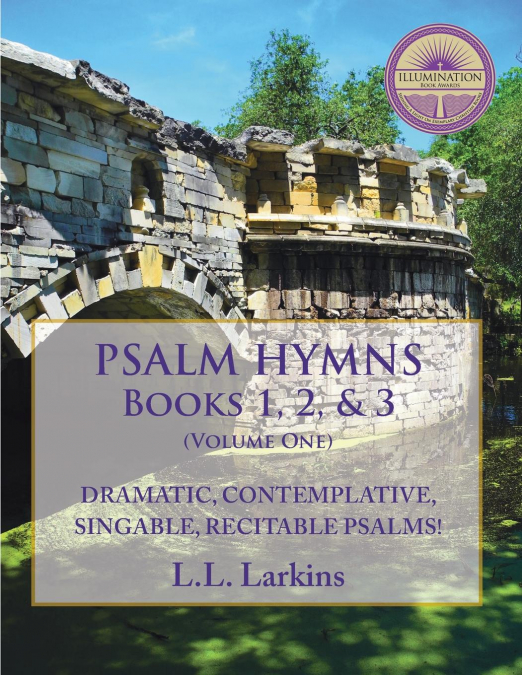
L. L. Larkins
THIS IS THE BIG HANDBOOK, Books 1-3, PSALMS 1-89. Bring along this wonderful edition to study and sing on a tour of Israel... walking through the gates of Jerusalem, tracing the twelve tribes is enhanced. These are the songs and prayers of the shepherd boy turned King David.The Psalms were meant to be sung! This is your go-to resource for singable, recitable Psalm lyrics. Now you can sing your next Bible study. This is a game-like fun way to bond and discuss real life issues in any worship setting, and equip members in many aspects of theology. While some books teach about the Psalms, none offer small group participation, or quick personal memory work, like this.Recipient of the 2017 Illumination GOLD Medal in Education and Finalist in Foreword Performing Arts. Here are the musical contemplations of Queen Esther and the disciples of Jesus. Your spiritual ancestors also went through fire and flood.Who were the prophets who were forced to sing in exile for their captures? Who were the Sons of Korah who escaped their father's destruction and became prolific songwriters? Find out in this collection of classics, Psalm 1 through 89.When adapting true scripture lyrics to traditional hymn tunes, young musical tastes can create fresh style. Use for unique theater or drama presentations, for an emphasis in counseling, for left-brain-right-brain interactive exercises, for character building memory work, or as a pastoral aid. For private meditation and for worship retreats!Psalm Hymns reflect on the many loving-kindnesses of God and also contemplate the odd silences. Raw, classic prayers for a creative's portfolio. From the famous Psalm 5, Psalm 8, Psalm 23, Psalm 19 and Psalm 27 to the obscure Psalms: 1 to 4, or 9 through 17, and Psalms 35 and 36 onward, find the dramatic historical pleas of mortal souls together with their worship and praises in singing and recitation. Use this poetry for personal and communal reflection.'The Psalms are prescribed and authorized for worship throughout God's kingdom, and without them, our worship is censored, uninformed and incomplete.' - Timothy Raymond (editor for Credo Magazine, Indiana)The first three of five volumes of the Davidic Psalms (Hebrew tradition) are set to the rhythm of Christian hymns of the English and American traditions. How would your faith change if you were to sing a psalm a day, evening or morning? How would your community of faith be enriched if you were to include a psalm of historical context, testimony or lament to your services?'Psalms,' in the Hebrew means 'Praises.' Let the message about the Messiah dwell richly among you, teaching and admonishing one another in all wisdom, and singing psalms, hymns, and spiritual songs, with gratitude in your hearts to God. Colossians 3:16 (HCSB) The phrase, 'teaching and admonishing', means there should be a place in our worship centers for historical education of the Psalms, performance, and discussion. Here, they expressly describe the wonders of God during terrifying events, illness, and betrayal, describing also God’s splendor in nature. They describe human relationships with God during life's miracles.Turn Psalms 1-89 into a modern Psalter, sing or recite uncensored human pleas in fear and tragedy during the odd silences of God.Uses include praise, education, character building texts, dramatic story-telling, a performance portfolio of knock-out scripts, brain teasing memorization, meditations, and laments for liturgy & retreats.CAPTURE BOOKS